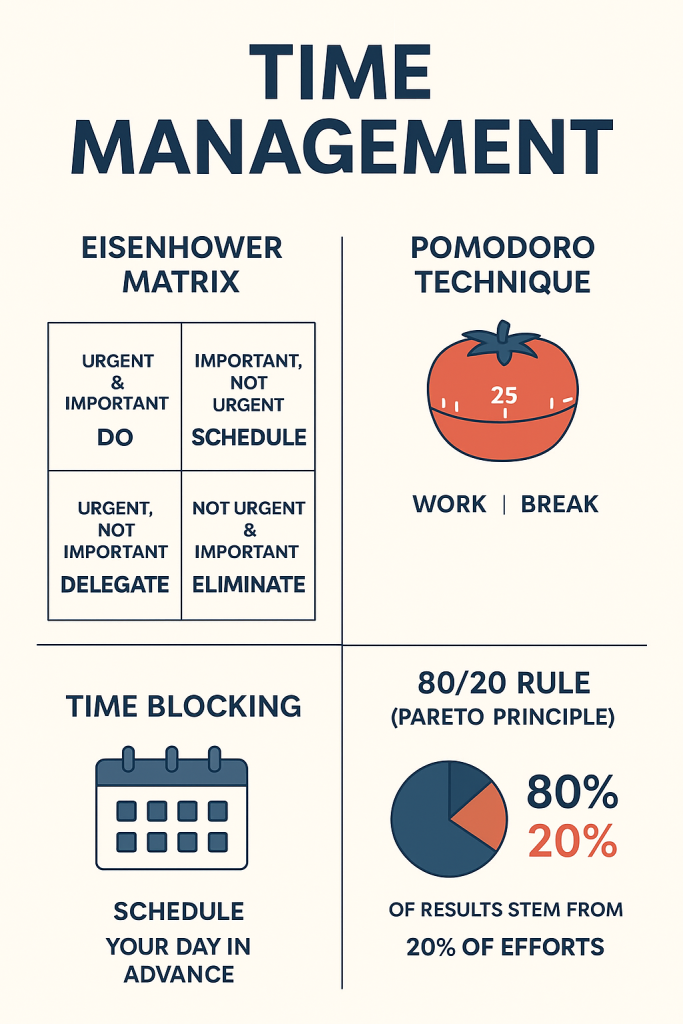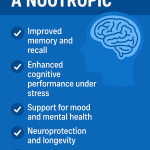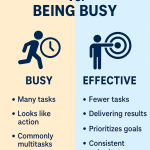Why Time Management Is the Secret to Success
Time management is more than just making to-do lists or blocking hours on your calendar—it’s the backbone of productivity, success, and balance in both personal and professional life. If you’ve ever felt overwhelmed by tasks piling up or like the day slips away without accomplishing your priorities, then you already understand why time management matters. The way you manage time directly impacts your energy, focus, and long-term results.
In this guide, we’ll break down time management strategies supported by research, explore techniques like the Eisenhower Matrix and the Pomodoro Technique, and dive into tools that can help you reclaim your hours. Whether you’re a student, professional, entrepreneur, or simply someone looking to improve your daily routine, these insights will help you create more time for what truly matters.
What Is Time Management?
Defining Time Management
At its core, time management is the process of planning, organizing, and intentionally allocating your time to maximize efficiency and achieve specific goals. Instead of reacting to the day’s chaos, effective time management gives you control over how you spend your hours.
Why It Matters in Modern Life
With endless notifications, digital distractions, and increasing demands at work and home, managing time is more important than ever. Studies show that poor time management leads to higher stress, burnout, and reduced productivity (American Psychological Association, 2023). On the other hand, practicing structured time management leads to better mental health, higher output, and greater life satisfaction.
For a deeper dive into practical strategies, check out this helpful resource: The Ultimate Guide on Time Management.
The Science Behind Time Management
Cognitive Load and Productivity
Our brains can only handle so much at once. Psychologists refer to this as cognitive load—the total mental effort being used at a given time. When your to-do list is scattered and disorganized, your brain wastes energy switching between tasks. According to the Journal of Experimental Psychology (2019), multitasking can reduce efficiency by up to 40%. Time management helps lower this cognitive load, allowing you to focus deeply on fewer, more important tasks.
The Role of Circadian Rhythms
Ever notice how you feel most focused in the morning or hit a slump mid-afternoon? That’s your circadian rhythm at work. Research from the National Institutes of Health shows that aligning your most demanding tasks with your peak energy times improves performance. Time management techniques that factor in your natural rhythms—like scheduling creative work in the morning and admin tasks later—can drastically improve results.
Common Time Management Challenges
Procrastination
Procrastination is the enemy of productivity. It’s not just laziness—it’s often linked to fear of failure, perfectionism, or task aversion. A study in Personality and Individual Differences (2016) found that chronic procrastinators experience higher stress and worse performance.
Distractions
From buzzing smartphones to endless email notifications, distractions can eat up hours without you noticing. On average, it takes 23 minutes to refocus after a single interruption (University of California, Irvine).
Overcommitment
Saying “yes” to everything leaves little time for what’s actually important. Overcommitment stretches you thin and makes it impossible to give your best to any one task.
Proven Time Management Techniques
The Eisenhower Matrix
Former U.S. President Dwight D. Eisenhower once said, “What is important is seldom urgent, and what is urgent is seldom important.” His method divides tasks into four categories:
- Urgent & Important – Do these immediately.
- Important, Not Urgent – Schedule these.
- Urgent, Not Important – Delegate these.
- Not Urgent & Not Important – Eliminate these.
This simple framework helps you focus on tasks that truly matter instead of drowning in busywork.
The Pomodoro Technique
Developed by Francesco Cirillo in the 1980s, the Pomodoro Technique involves working in focused 25-minute intervals (Pomodoros) followed by short breaks. Studies show this method enhances concentration, reduces fatigue, and improves overall productivity.
Time Blocking
Popularized by Cal Newport in Deep Work, time blocking involves scheduling every part of your day in advance, assigning specific hours for specific tasks. Instead of a loose to-do list, your calendar becomes a blueprint for your day.
The 80/20 Rule (Pareto Principle)
This principle states that 80% of results often come from 20% of efforts. Identifying and prioritizing those “high-impact” activities is a cornerstone of effective time management.
Tools and Apps for Better Time Management
Digital Tools
- Todoist – for task management and prioritization.
- Notion – all-in-one workspace for projects, notes, and scheduling.
- RescueTime – tracks digital habits and highlights time-wasters.
- Google Calendar – easy scheduling and reminders.
Analog Tools
Sometimes pen and paper beat apps. A simple planner or bullet journal can provide clarity, reduce digital overwhelm, and encourage mindful task management.
Time Management for Different Lifestyles
Students
Balancing coursework, social life, and part-time jobs can be overwhelming. Strategies like the Pomodoro Technique, prioritization, and digital planners help students avoid all-nighters and manage stress.
Professionals
In the workplace, time management is critical for meeting deadlines and avoiding burnout. Time blocking, meeting management, and clear goal-setting are especially useful here.
Entrepreneurs
For business owners, every hour counts. Effective delegation, outsourcing, and strict prioritization can free up time to focus on growth instead of getting lost in details.
Managing Time in Relationships
Time management isn’t only about work—it’s also about nurturing relationships. Making time for loved ones, setting boundaries around work hours, and being fully present improves both productivity and emotional well-being. If you want to explore more on this topic, check out our Relationships Insights.
The Role of Habits in Time Management
Morning Routines
Starting the day with a structured morning routine sets the tone for productivity. Exercise, journaling, or planning your top three tasks can give you momentum.
Evening Routines
Reflecting on your day, preparing for tomorrow, and setting aside digital devices before bed help you rest better and stay consistent.
The Power of Consistency
Time management is not a one-time fix—it’s a habit. Consistently applying strategies leads to long-term success.
Time Management and Stress Reduction
Poor time management is closely linked to higher stress and burnout. When you’re always rushing, deadlines pile up, and you feel out of control, your cortisol (the stress hormone) spikes. By planning ahead, prioritizing, and creating realistic schedules, you reduce mental pressure and create more balance.
According to a Harvard Business Review study, professionals who practiced structured time management reported 25% lower stress levels compared to those who didn’t.
Misconceptions About Time Management
“Time Management Means Doing More”
Wrong. Time management isn’t about cramming more tasks into your day—it’s about making time for what matters most.
“I Don’t Have Time to Plan”
In reality, spending just 10–15 minutes planning your day can save hours of wasted effort.
“Multitasking Makes Me More Productive”
Research proves multitasking reduces efficiency. Time management works best when you focus on one task at a time.
How to Build Your Personalized Time Management System
- Identify Priorities: Write down your goals for the week.
- Select Techniques: Try methods like time blocking or the Pomodoro Technique.
- Test and Adjust: Not every system works the same for everyone—track what fits your lifestyle.
- Stay Flexible: Unexpected events will happen—good time management allows for adjustments without losing focus.
Real-Life Examples of Time Management Success
- Elon Musk is known for scheduling his day in five-minute blocks, allowing him to juggle multiple companies effectively.
- Benjamin Franklin had a daily routine focused on productivity, reflection, and personal growth.
- Students who practice structured study blocks achieve better academic performance than those who “cram” last-minute (Educational Psychology Review, 2020).
Final Thoughts on Time Management
Time management isn’t about rigid schedules or stripping joy from your day—it’s about freedom. By organizing your time effectively, you create space for work, rest, hobbies, and relationships. It’s not just a productivity hack—it’s a lifestyle change that helps you live intentionally.
Remember, the key is to start small. Pick one strategy—like using the Eisenhower Matrix or testing Pomodoros—and build from there. Over time, these small changes compound into a more structured, stress-free, and fulfilling life.
Call to Action
Are you ready to take control of your time and boost your productivity? Start today by identifying your top three priorities and blocking time for them on your calendar. For more insights on balancing life and finances, check out our guide on Frugality and Personal Finance.



